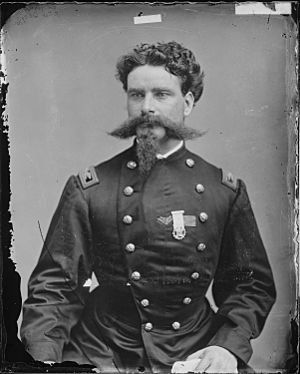Percy Wyndham (soldier) facts for kids
Quick facts for kids
Percy Wyndham
|
|
|---|---|

Wyndham during the American Civil War
|
|
| Born | 22 September 1833 The Downs, English Channel |
| Died | 27 January 1879 (aged 45) Rangoon, Burma |
| Allegiance |
|
| Service/ |
French Navy (1848–1850) British Army (1851–1852) Austrian Army (1852–1860) Garibaldi's Volunteers (1860–1861) Union Army (1862–1864) Royal Italian Army |
| Rank | |
| Commands held | 1st New Jersey Cavalry Regiment |
| Battles/wars | French Revolution of 1848
|
| Awards | Military Order of Savoy |
| Other work | balloonist |
Percy Wyndham (born September 22, 1833 – died January 27, 1879) was an English soldier and adventurer. He fought in the armies of many different countries, including during Italy's fight for independence and the American Civil War.
Contents
Early Life and Military Adventures
Percy Wyndham was born in 1833 on a ship called Arab in a place called the Downs. He claimed his father was a soldier named Colonel Charles Wyndham. His father supposedly worked for the famous Duke of Wellington.
Wyndham started his military career very young, at just fifteen years old. He joined the Students' Corps during the French Revolution of 1848. This was a big event in France where people fought for change.
Serving Different Nations
After the French Revolution, Wyndham said he joined the French Navy for a short time. Then, from 1851 to 1852, he briefly served in the Royal Artillery of the British Army.
He then spent eight years, until 1860, as a cavalry officer in the Austrian Army. Cavalry officers ride horses in battle.
Fighting with Garibaldi in Italy
Wyndham then traveled to Italy to join Garibaldi. Garibaldi was a famous Italian general who led the fight to unite Italy. Wyndham claimed he fought in several important battles with Garibaldi.
He said he was promoted to lieutenant-colonel and given command of a brigade. A brigade is a large group of soldiers. He also claimed that King Victor Emmanuel knighted him and gave him an award called the Military Order of Savoy. This is why he sometimes used the title "Sir."
American Civil War Service
Whether all his early claims were true or not, it is known that Percy Wyndham did go to North America. He served in the Union Army during the American Civil War. This war was fought between the northern (Union) and southern (Confederate) states of America.
Captured and Wounded
Wyndham was captured by Confederate forces in June 1862. However, he was exchanged for other prisoners just a few weeks later. In August 1862, he commanded the 1st New Jersey Cavalry Regiment at the Battle of Thoroughfare Gap.
He was wounded in another battle, the Battle of Brandy Station, in June 1863. After that, he worked in Washington, D.C..
Accusations and Retirement
While in Washington, D.C., another English politician named Percy S. Wyndham accused him of being a fraud. Percy Wyndham defended himself by explaining his career and showing documents.
He wanted to be promoted to Brigadier, a higher rank. A general named Major-General Joseph Hooker supported him, saying he was "capable, prompt, and efficient." However, he did not get the promotion. Another officer had accused him of not being loyal and thinking about joining the Confederate Army. Wyndham continued to receive his army pay until he left the Union's service in July 1864. Some stories say he then ran a military school for boys.
Later Life and Tragic End
In 1866, Percy Wyndham went back to Italy. He continued his military service in the Royal Italian Army. After this, he tried several business ventures, but they did not work out.
Ballooning in India
Wyndham then traveled to India. To make money, he sold his military awards. He started giving demonstrations with hot air balloons to earn a living.
On January 27, 1879, a sad accident happened. His balloon burst open while he was in the air. He fell about three hundred feet into a lake near Rangoon, Burma. He died from the fall.
A local newspaper reported his death, saying it was the end of a "singular and adventurous career." His death was even reported in Scotland, far away. The Inverness Courier newspaper wrote about him, calling him a "distinguished soldier of fortune." They noted his service with Garibaldi and in the American Civil War. They also mentioned his varied life, including starting a comic paper and being an opera manager.
 | Bayard Rustin |
 | Jeannette Carter |
 | Jeremiah A. Brown |

